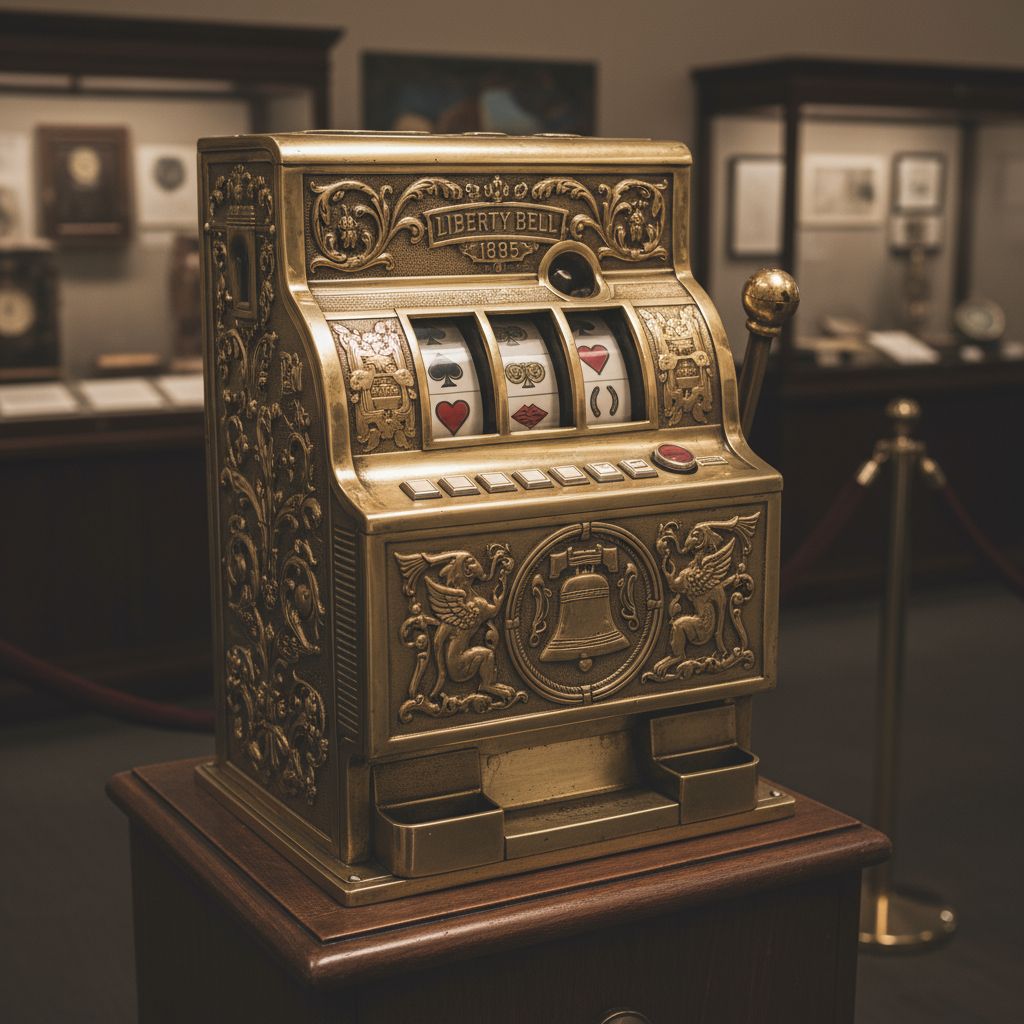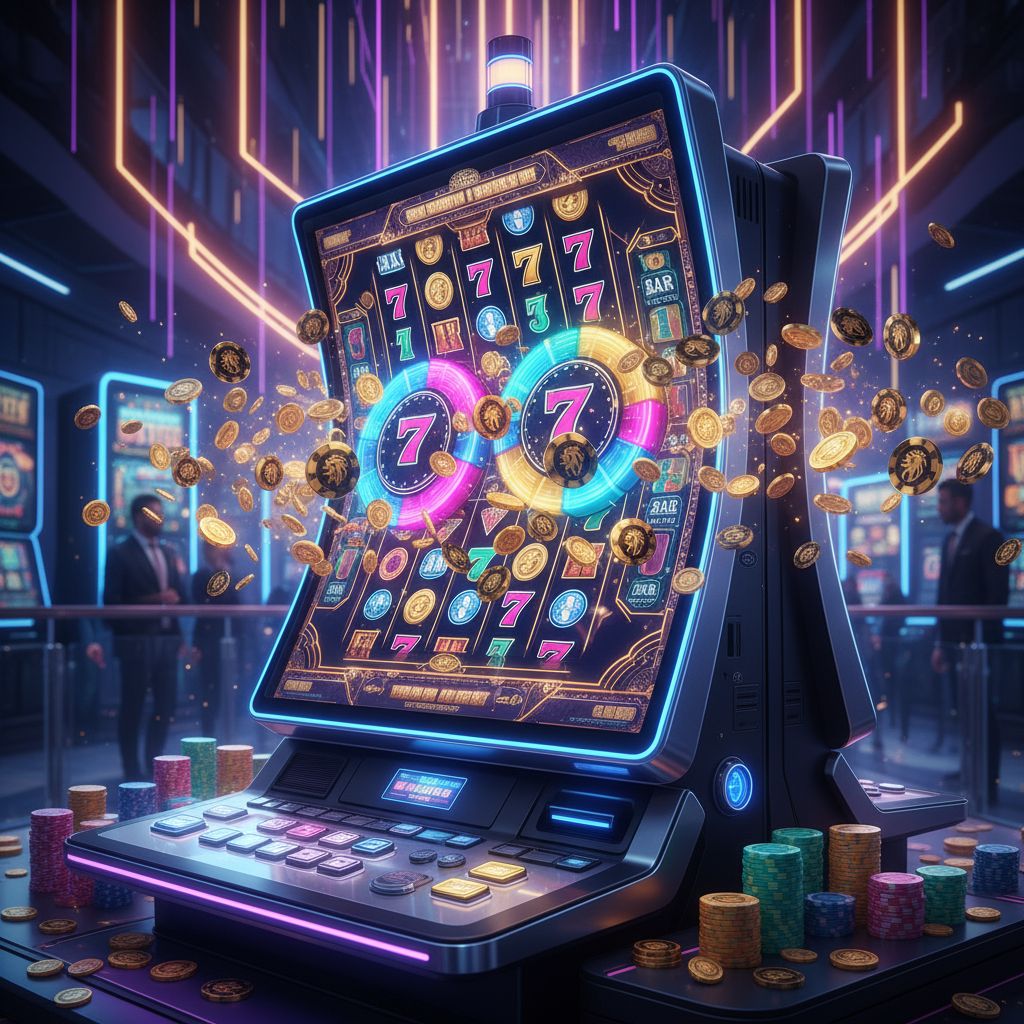Slot machines generate approximately 70% of the average U.S. casino's income, making them the most profitable gambling mechanism in the industry. With the global online gambling market projected to reach $286.4 billion by 2035 from $105.5 billion in 2025, slot gaming continues to dominate both physical and digital casino landscapes.
From Liberty Bell to Digital Dominance
The journey of slot machines began in 1895 when Charles Fey, a San Francisco mechanic, invented the Liberty Bell—the first true slot machine featuring three spinning reels with five symbols: horseshoes, diamonds, spades, hearts, and a liberty bell. This revolutionary device simplified the complex poker-based gambling machines of the era, making automatic payouts possible for the first time.
By 1907, manufacturers like Herbert Mills began mass-producing similar machines, and by 1908, "bell" machines had spread to cigar stores, brothels, and barber shops across America. The 1930s introduced fruit symbols—cherries, lemons, oranges, and watermelons—as a clever workaround to gambling restrictions during Prohibition.

The Digital Revolution: RNG Technology
The 1970s marked a seismic shift when Bally Technologies launched "Money Honey," the first electromechanical slot machine using electronic components. However, the most significant innovation came with Random Number Generator (RNG) technology, which fundamentally transformed how slot machines operate.
Modern RNGs are sophisticated software algorithms that continuously generate thousands of random numbers per second, even when the machine isn't being played. When a player presses the spin button, the RNG selects the most recent number and maps it to specific reel positions, ensuring every spin is independent, unpredictable, and fair. This technology replaced the purely mechanical randomness of earlier machines with mathematical precision that makes outcomes impossible to predict or manipulate.
The introduction of microprocessors in the 1980s allowed manufacturers to assign different probabilities to each symbol on every reel, creating the illusion that winning symbols were "so close" while maintaining strict mathematical house edges.
Cutting-Edge Innovations Shaping 2025
The slot gaming industry is experiencing rapid technological transformation with several groundbreaking trends emerging in 2025.
Immersive Technologies
Virtual Reality (VR) and Metaverse integration are redefining player engagement by offering immersive, interactive environments where gamblers can socialize, explore virtual casinos, and experience realistic gameplay that replicates physical casino atmospheres. Augmented Reality (AR) features are enhancing mobile slot experiences by overlaying digital elements onto real-world environments.

Artificial Intelligence and Personalization
AI and machine learning have enabled casinos to deliver hyper-personalized gaming experiences by analyzing player demographics, betting habits, time of day, location, and even weather patterns in real-time. Predictive AI continuously evaluates customer behavior to optimize game mechanics, detect fraud, prevent problem gambling, and provide tailored game recommendations that maximize both player satisfaction and casino profitability.
Blockchain and Cryptocurrency
Blockchain technology is transforming online slot gaming by enabling provably fair gameplay, transparent record-keeping, and secure digital payments. Cryptocurrency integration offers players faster transactions, lower fees, anonymous payments, and instant cross-border transfers—making digital currencies increasingly popular among tech-savvy gamblers.
Mobile Gaming and Cross-Platform Play
The shift to mobile-first experiences represents one of the industry's most significant trends. Modern slot games are developed using HTML5 technology, allowing seamless deployment across desktop, mobile, and tablet platforms without compromising quality.
Contemporary mobile slots leverage device-specific features including haptic vibration feedback, camera integration, GPS location services, and touchscreen optimization to create intuitive, engaging experiences. Developers now prioritize lightweight game versions for regions with limited connectivity, ensuring global accessibility.
Casino platforms have adapted their entire libraries for mobile compatibility, with games automatically scaling to fit various screen sizes and resolutions across iOS and Android devices.

Enhanced Player Experiences
Modern slot development has evolved far beyond simple spinning reels.
HD and 4K graphics powered by sophisticated graphics engines deliver realistic lighting, shadows, textures, and physics that make symbols and environments come alive. Popular 3D slots like "2 Million BC" and "Cirque Du Slots" transport players into cinematic worlds filled with motion and visual effects.
Story-driven slots now feature rich narratives that evolve as players progress, transforming traditional slot games into immersive storytelling experiences with interactive plots and character development. Social gaming elements incorporate multiplayer experiences, in-app purchases, gamified features like levels and rewards, and even live dealer slots that bridge traditional slot machines with live dealer table games.
Advanced jackpot systems now offer multi-layered progressive jackpots with collaborative reward structures for social play, providing more frequent wins to attract diverse player demographics.
Market Growth and Revenue Statistics
The commercial casino industry continues its robust expansion, with traditional casino slot machines and table games generating $4.45 billion in May 2025 alone, representing a 3.9% increase over the previous year. Slot revenue specifically grew 4.4% to reach $3.24 billion in that single month.
For the first five months of 2025, combined revenue from casino slot machines and table games totaled $21.06 billion, marking a 1.8% increase over the same period in 2024. The United States alone operates approximately 200,000 slot machines in Nevada, with over 830,000 electronic gaming machines functioning nationwide by the early 2010s.
Slot machines and video poker machines have become the economic backbone of American casinos, generating income through high-volume, rapid play at stakes ranging from five cents to a dollar, with machines adjustable for any desired profit margin.
The Psychology of Slot Engagement
Research has revealed the powerful psychological mechanisms that make slot machines so compelling—and potentially problematic.
Associate Professor Natasha Dow Schüll of New York University coined the term "machine zone" to describe the immersive state slot players experience, where they lose awareness of time, space, bodily sensations, and monetary value. University of Waterloo psychologist Mike Dixon found that players experience heightened arousal from sensory stimuli in slot machines, with "losses disguised as wins" (LDWs) triggering arousal levels comparable to actual wins.
A landmark study by psychologists Robert Breen and Marc Zimmerman discovered that video slot machine players reach debilitating levels of gambling involvement three times faster than those who play traditional casino games, even among individuals with no previous gambling problems. Eye-tracking research in UK bookkeepers revealed that problem gamblers fixate more frequently on amount-won messages than recreational players.

Responsible Gaming Initiatives
As slot machines have become more sophisticated and psychologically engaging, the industry has implemented various responsible gaming measures to minimize potential harm.
Modern casinos employ responsible gambling policies that include self-exclusion programs allowing individuals to voluntarily ban themselves from gambling establishments, along with employee training programs to help staff recognize signs of problem gambling and assist affected patrons. Casinos also implement strict age verification policies, identification scanners to prevent fake IDs, and responsible advertising practices that avoid targeting vulnerable populations.
Many operators now support research and education efforts related to responsible gambling, funding studies and partnering with organizations focused on problem gambling prevention. Guidelines for responsible gambling emphasize setting both time and money limits before entering a casino, gambling only for entertainment rather than profit, and recognizing warning signs of problematic behavior.
The Future of Slot Gaming
Looking ahead, the slot machine industry continues to innovate at a rapid pace. Emerging trends include deeper blockchain integration for enhanced transparency, expanded social gaming features with multiplayer competitions, advanced loyalty programs powered by AI analytics, and increasingly sophisticated story-driven gameplay that blurs the line between slots and video games.
The convergence of cryptocurrency payments, VR/AR experiences, AI personalization, and cross-platform accessibility is creating an entirely new paradigm for slot gaming—one that maintains the core excitement of the original Liberty Bell while embracing cutting-edge technology to deliver experiences Charles Fey could never have imagined.
As the online gambling market accelerates toward its projected $286.4 billion valuation by 2035, slot machines—whether physical or digital—will undoubtedly remain at the heart of the casino industry, continuously evolving to meet changing player expectations while navigating the complex balance between entertainment and responsible gaming.



